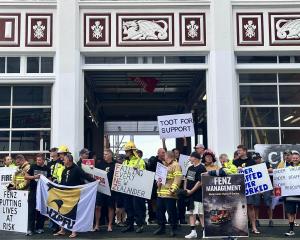
- SUBSCRIBER Class Act 2014 - Where are they now?
New Zealand might not be a large energy user on the global scale but it can be a leader among small users, according to post-graduate researcher Jack O’Leary.
The former Otago Daily Times Class Act recipient says with a ‘‘fantastic abundance of resources’’ and much academic and technical knowledge, the country can be at the forefront of sustainable energy initiatives.
Based at the University of Waikato, he is part of the Ahuora research project, which has $12.5 million of MBIE funding to help New Zealand industry decarbonise process heat.
Process heat includes the fuel that industries burn for steam, hot water and hot gases as they convert raw materials into products.
The researchers are using digital twin technology. This is a computer model of a physical environment - in this case, a factory - with real-time data shared between the two domains. Because it is adaptive, the digital twin can respond to changing circumstances and learn from previous experience, making for better decision-making.
The digital tools will be freely available to manufacturers, allowing them to identify energy efficiency opportunities and adopt new technologies such as high-temperature heat pumps. The hope is that they will also transition away from fossil fuels towards renewable energy sources, such as electricity from wind and solar and heat from biomass.
As well as teaching undergraduate papers, O’Leary is completing a PhD in biological and chemical engineering, focusing on the economics of distributed renewables. This is when energy is generated from renewable sources near the point of use instead of at centralised locations.
The 27-year-old says he is looking into three areas of interest: large, ‘‘utility-scale’’ solar farms; most houses having solar panels on their roofs - which has the potential to bring electricity prices down and create good symbiosis with industrial users; and industries generating energy on site. The last could include plants having a large solar array on their roof or a neighbouring field, getting energy from their effluent, or dairy co-operatives planting trees for energy use on partnered farms.
Some of these things are already happening but in many cases, economic levers are needed, he says. In the case of rooftop solar, that might be low-interest loans backed by the Government.
The aim is to transition to renewable sources in an economic way so it is crucial to work with systems already in place when possible.
‘‘We’ve got a lot of existing technology that’ll do the job. I think we just have to use it smartly.’’
Decarbonising industry is important because a large dairy or meat-processing plant can use as much energy as a town, and burning fossil fuels to supply process heat accounts for 28% of New Zealand’s overall energy emissions, he says.
‘‘That means that previously they’ve been big carbon emitters but it also means you can make a large amount of change by changing one factory, rather than having to change an entire town’s way of doing things.’’
New Zealand has advantages when it comes to renewable energy but there has been underinvestment in the electricity network, he says, adding he is concerned about the negative impact of lobbying in politics and the lack of a long-term, apolitical infrastructure plan for the country.
‘‘I think that politicising energy is not that constructive because we just end up wasting money every three years...’’
A former under-23 world champion in the quadruple sculls, O’Leary hoped to row at the Olympics. However, he retired from the sport last year after realising he would have to devote the next four to eight years to the goal and even then, might not make it.
A ‘‘bad run-in’’ with Covid, which left him with diminished lung capacity, also played a part in his decision. Instead, he has taken up mountainbiking and kayaking.
The former Kavanagh College student is proud he pursued the Olympic dream, despite the outcome.
‘‘The skills and experiences I picked up during my years in the high-performance system have given me a great outlook on life and driven me to achieve in broader areas.’’
It is ‘‘really cool’’ to be part of a co-ordinated effort to create a sustainable energy future, and to think he could make a difference, he says.
‘‘I’m passionate about creating the best future for our country and world. My goal is to help lead our energy transition and hopefully make positive social change along the way.’’













